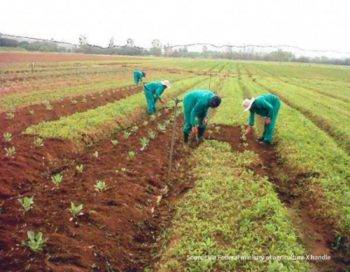The Executive Secretary of the National Agricultural Development Fund (NADF), Mohammed Ibrahim, has revealed a collaborative effort between the Federal Government and NADF aimed at supporting ginger farmers in three states and Abuja with a substantial sum of N1.6 billion. This initiative, part of the Ginger Recovery Advancement and Transformation for Economic Empowerment program, seeks to alleviate the challenges faced by ginger farmers following the recent outbreak of ginger blight epidemic.
During the unveiling of the Ginger Blight Epidemic Control Taskforce Support Initiative in Kaduna, Ibrahim emphasized the severity of the situation, which has adversely affected approximately 15,000 ginger farmers across Kaduna, Plateau, Nasarawa, and the Federal Capital Territory (FCT). The initiative has received the endorsement of the Office of the Vice President, underlining its significance in addressing the crisis gripping the ginger farmers community.
This comprehensive aid package, named the GRATE package, symbolizes the government’s commitment to the recovery and advancement of the ginger sector. Ibrahim highlighted the timing of this support, noting that the epidemic struck just as the nation was witnessing significant growth in ginger exports. With this assistance, ginger farmers can hope for a revitalization of their livelihoods and a renewed sense of economic stability.
Impact of Ginger Blight Epidemic on Ginger Farmers
The recent outbreak of the ginger blight epidemic has wreaked havoc on the livelihoods of thousands of ginger farmers across several states and the FCT. The devastation caused by this disease has not only led to significant financial losses but has also jeopardized the future prospects of the ginger farming industry. Ginger Farmers, who were beginning to reap the benefits of increased ginger exports, now find themselves grappling with the harsh reality of crop destruction and economic uncertainty.
The plight of these ginger farmers underscores the urgent need for government intervention and support. The N1.6 billion assistance package announced by the Federal Government, in collaboration with NADF, offers a glimmer of hope amidst the despair. By providing essential supplies and resources through the GRATE package, authorities aim to mitigate the adverse effects of the epidemic and pave the way for the resurgence of the ginger farming sector.
However, while this assistance is a welcome development, it is imperative for stakeholders to ensure its effective implementation and equitable distribution. Transparency and accountability must be upheld to guarantee that the aid reaches the most affected ginger farmers and contributes to their long-term recovery and empowerment.
Future Prospects for Ginger Farming Sector
Despite the challenges posed by the ginger blight epidemic, the unveiling of the Ginger Blight Epidemic Control Taskforce Support Initiative signals a renewed commitment to the revitalization of the ginger farming sector. With government support and collaborative efforts from various stakeholders, there is optimism for the restoration of productivity and growth in ginger production.
Moving forward, it is crucial for policymakers to prioritize disease control measures and invest in research and development to safeguard the ginger farming industry against future outbreaks. Additionally, initiatives aimed at enhancing market access and promoting value addition will further bolster the resilience and competitiveness of ginger farmers in the global market.
As the nation endeavors to recover from the aftermath of the ginger blight epidemic, concerted efforts from all quarters will be essential in ensuring the sustainability and prosperity of the ginger farming sector for generations to come.
Nigerian Ginger: A Global Favorite for Its Quality and Medicinal Value
Nigeria has long been renowned for its superior ginger, sought after worldwide for its potency and high oleoresin content, making it ideal for various culinary and medicinal applications. Globally, the Nigerian ginger holds a distinguished position due to its exceptional quality, drawing significant attention from both food and pharmaceutical industries. With its robust flavor and rich aroma, Nigerian ginger has garnered acclaim in international markets, making it a preferred choice for consumers and manufacturers alike.
The demand for Nigerian ginger surpasses current production levels, indicating ample opportunity for increased cultivation and export. This presents a promising prospect for Nigerian farmers and the economy as a whole. The country’s ginger sector stands poised for expansion, with the potential to meet the rising global demand and capitalize on its reputation for excellence.
Key Markets and Export Opportunities
Nigeria’s prime ginger markets span across continents, with major destinations including South Africa, India, Morocco, and Dubai. In these regions, Nigerian ginger finds its way to domestic food processors and international traders, showcasing its versatility and broad appeal. The unique attributes of Nigerian ginger, such as its aroma, potency, and high oil and oleoresin content, set it apart in the competitive global market landscape.
Experts emphasize the medicinal value of Nigerian ginger, further enhancing its desirability in the international arena. Its therapeutic properties make it a valuable commodity not only for culinary purposes but also for pharmaceutical applications. As demand continues to surge, Nigerian farmers and exporters are poised to capitalize on the lucrative opportunities presented by the global ginger market, solidifying Nigeria’s position as a leading supplier of premium quality ginger worldwide.
Table of Contents
Discover more from OGM News NG
Subscribe to get the latest posts sent to your email.














